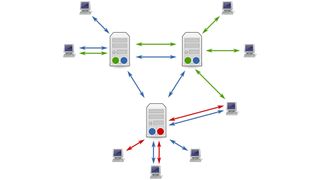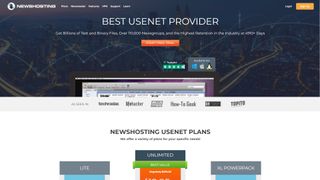What is Usenet?
We delve into the mysterious depths of the Usenet to help you understand what it is and how you can use it for your business

What is Usenet?
Usenet has similarities to forums, online message boards, and social media. It contains newsgroups that enable the sharing of files and information, and it’s relatively anonymous and private compared to mainstream social media. You will require one of the best Usenet providers and a Usenet newsgroup reader, and the learning curve is quite steep – but for many, it’s worth it.
What does Usenet do?
- Enables posting and sharing of articles, images, and other files in a structured, relatively anonymous manner without the need for a VPN or other identity-masking software
- Provides a decentralised information-sharing platform that’s not controlled by mainstream media or other companies
- Allows the streamlined exchange of information between interested parties across the world
- Offers highly secure file transfer solutions that can be used with various types of data
- Boasts huge amounts of consumer data and information that businesses can use for market research, if the right techniques are applied
- Provides excellent networking opportunities for small business owners and entrepreneurs who don’t have a large budget yet
- Enables long-term file and information storage in a secure, affordable manner
How businesses can use Usenet

Although Usenet doesn’t have any direct business applications, it remains a versatile technology that can be very useful when harnessed properly. In the past, it was heavily used for socialising, similar to forums like Reddit.
There are still plenty of active niche groups, particularly in the tech field, but most people nowadays use it for file transfer and storage. Below, we outline a few of the most common ways that businesses take advantage of Usenet in the modern world.
Like more traditional social media, Usenet provides excellent opportunities for you to build a community around your business. Start by creating a new profile and ensuring you use your business name and information.
Join relevant newsgroups and begin posting to grow brand familiarity and position yourself as an authority figure in the space. It’s often a good idea to target niche Newsgroups with smaller user bases, as it’s easier to stand out as authoritative in these.
For example, let’s say you run a small digital agency. By joining active newsgroups focusing on topics like social media marketing and search engine marketing, you can begin engaging with people and getting your name out there.
Usenet also presents countless opportunities for developing new business partnerships. Within newsgroups, you will be able to connect with other parties working in the same space. If nurtured properly, these connections can quite easily lead to new marketing or professional partnerships.
Get the ITPro. daily newsletter
Receive our latest news, industry updates, featured resources and more. Sign up today to receive our FREE report on AI cyber crime & security - newly updated for 2024.
Let’s say, for example, that you run a web design agency specialising in small business websites. But you’re looking for a content writing company to partner with. You might decide to join a couple of relevant newsgroups and begin engaging with people, keeping your eyes out for likely candidates at the same time.
With Usenet, you can advertise your business without ever having to pay a cent. Really, this process is quite similar to building a community, as you simply want to establish yourself and your business as an authority in your niche and build audience trust.
You won’t actually be advertising your website directly with marketing copy. Instead, you want to create informational posts and answer questions while carefully weaving links to your site into your content. This will take some time, but you could experience rapid traffic growth if you get it right.
Joining the right newsgroups and browsing their content regularly is a great way to keep up with recent advances in your industry. Newsgroups enable people to discuss new software and technology, and frequenting them will help your business stay up to date technologically.
Last, but not least, newsgroups place you in direct contact with huge numbers of people. This makes Usenet the perfect place to perform mass market research. Using some combination of AI, data scraping tools, and direct market surveys, you should be able to find a wealth of information about potential customers.
Features and benefits of Usenet
Anonymity

Usenet is an excellent platform for those wishing to browse with a high degree of privacy and anonymity. By default, Usenet browsing is unencrypted, making your browsing visible to your ISP.
However, most Usenet providers offer SSL encryption, and you can also use a VPN to hide your browsing habits from nosy third parties. It’s also worth noting that most major Usenet service providers will disclose your personal information if required to do so by a major law enforcement agency.
Rapid file-sharing
Usenet offers an attractive alternative to torrenting, and it can be used by businesses to share large files in a fast, secure manner. This is due to the use of something called server farms.
Basically, server farms are huge arrays of file servers designed to store and deliver the information on the Usenet. When you upload a file, each Usenet provider offering access to the newsgroup(s) you’re using will save a copy and make it available for download by third parties.
Group communication
It’s uncommon for businesses to use newsgroups for communication between team members, but there are loads of opportunities for communicating with the general public.
For example, newsgroups are excellent for networking, particularly for tech-savvy professionals. In niche groups, you will find loads of like-minded individuals whom you can bounce ideas off and ask questions.
This is particularly useful for entrepreneurs constantly seeking new knowledge. Information can be stored virtually indefinitely, and you can easily come back to old threads in the future.
Clear newsgroup hierarchies
On Usenet, you will find clearly structured newsgroup hierarchies. The hierarchy forms the first part of all newsgroup names, and basically tells you what the general subject matter is going to be. This makes it much easier to find relevant and interesting content.
The second part of a newsgroup’s name usually relates to a general topic, while third, fourth, and additional parts are added to define the topic of more specialised groups. There are nine major hierarchies, including humanities, news, computing, and miscellaneous.
Long file-retention time
File retention time refers to how long files are stored on the Usenet for. This varies between Usenet service providers, which basically store entire copies of the Usenet or specified parts of it.
A higher retention time is obviously better, as it enables you to access posts, articles, and files from longer ago. Some providers offer upwards of 4,500 days of file retention—over 12 years.
How much does a Usenet subscription cost?

Usenet itself is a completely free technology. However, it’s virtually impossible to access on your own. Before doing so, you will require a Usenet subscription. With this, you will have access to specified newsgroups—most providers don’t offer full access to all groups—along with other tools like browsers, search engines, and indexes.
Most Usenet providers are quite affordable, and you should be able to find one that suits your needs for less than £10 a month. For example, Newshosting, our number-one recommended provider, offers monthly subscriptions for £8.17 and annual subscriptions for £4.89 a month.
You will also need some sort of newsreader, which is used to browse and search newsgroups. Without a newsreader, you won’t be able to access Usenet content, even if you have a subscription with a service provider.
Some Usenet providers come with a free newsreader, but if yours doesn’t, you will need to purchase one. Free open-source options are available, but even premium options don’t usually cost more than a few dollars per month.
Usenet FAQs
We've answered some frequently-asked questions about Usenet to help you learn more about this platform.
Is Usenet legal?
Yes, Usenet is completely legal to use. However, there are aspects to it that can become illegal if you’re not aware of what you’re doing. For example, its file-sharing properties make it a popular medium for media piracy. Instances of people being prosecuted for downloading illegal files from Usenet are very rare, but media piracy remains illegal nonetheless.
Is Usenet still alive?
In short, yes Usenet is still alive. While it may not see the same popularity as it did perhaps a decade or two ago, it’s still used by millions around the world. Most people nowadays use it to share large files, although you will still find active Newsgroups covering certain topics. For example, many technical groups are still very active, which makes sense considering the technical expertise needed to take full advantage of Usenet.
Is Usenet still free?
Free Usenet service providers do exist, but they can be untrustworthy and often quite useless. They don’t usually have the same level of file retention as premium service providers, and their spam filtering and antivirus tools are often non-existent. We’d suggest paying for a Usenet service provider. You should be able to find a decent option in the range of £5 to £10 a month.
Can you still access Usenet?
Yes, you can still access Usenet. To do so, you will have to go through a Usenet service provider. These typically cost somewhere between £5 and £10 a month, and there are loads of options to choose from. Some providers offer access to specific types of Newsgroups, while others are much more versatile. You will also need a newsreader, which is included with most provider subscriptions.
Is Usenet anonymous?
Usenet provides a decent level of anonymity, and it’s easier to remain invisible within Newsgroups than it is on the internet in general. Identifying information is never shared, and no one is able to monitor your actions. However, Usenet providers can be forced to share information with law enforcement in some situations.
Main takeaways
- Usenet is an old technology that remains popular today, which enables rapid file sharing across the globe, and it’s used by people from all walks of life
- Usenet newsgroups are organised under a clear hierarchy, enabling you to quickly find relevant articles and information of interest
- There are numerous opportunities for businesses to take advantage of Usenet for marketing and growing their brand awareness
- To access newsgroups, you will need a Usenet service provider subscription, along with access to a newsreader
- The best service providers retain files for thousands of days, providing unbroken access to old information
Further reading on Usenet
Learn how to download from Usenet, if you're interested in downloading files from the platform. It's also worth learning about Google Groups, another modern method for accessing Usenet; and take a look at our other reviews of top Usenet providers, including Eweka, EasyNews, UsenetServer, and Giganews.
Usenet can be a great platform for marketing your business and growing a community. If you would like to learn about another popular digital marketing technique, you can read our guide to SEO marketing. You might also like to delve into how to build an effective marketing strategy with the cloud.
Daniel is a freelance technology and finance writer, whose scientific background in the natural sciences lends rigour and nuance to his informative, accessible articles. His reviews on website builders, web hosting and business web development grace the virtual pages of TechRadar Pro, WebsiteHostingRating.com, and HostingReview.com, as well as IT Pro Portal. Well-versed in blockchain, cloud computing and cybersecurity, Daniel takes a keen interest in all aspects of B2B and B2C tech.





